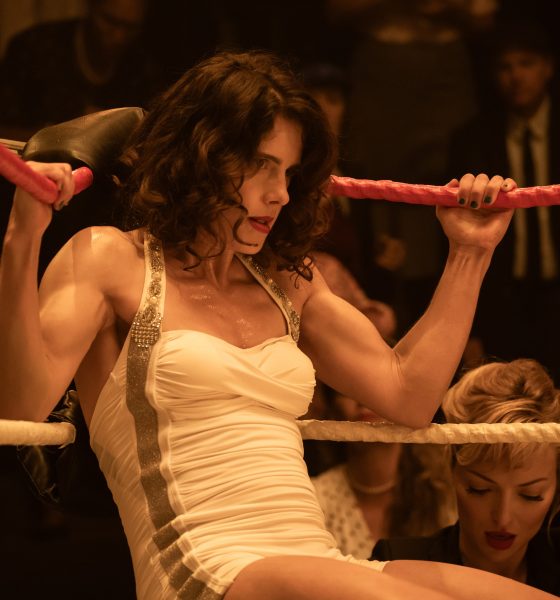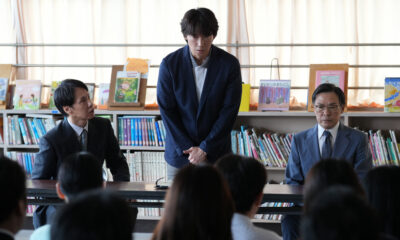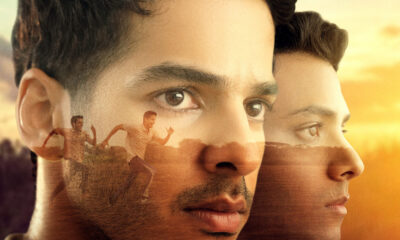

Movie Reviews
Queen Of The Ring ★★★
Released: 19 September 2025
Director: Ash Avildsen
Starring: Emily Bett Rickards, Josh Lucas
History rarely moves in a straight line. If you were to believe the WWE’s idea of history, women’s pro wrestling was largely a piss break spot and derided fan-service joke until the mid-2010s. A “Women’s Revolution” arrives out of nowhere and, suddenly, women were the equals of men and megastars in waiting. Even today, as generational characters and athletes like Rhea Ripley, Becky Lynch, Toni Storm, Mercedes Moné, Mayu Iwatani and more cross over out of wrestling’s bubble into semi-mainstream standom, the women’s roster in many major American promotions can struggle for both screentime parity and larger audience respect.
But it hasn’t always been like this. In the 2000s, during the dark Divas Division days, TNA’s Knockouts regularly showed up their male counterparts in the ring whilst the all-women promotion Shimmer played host to some of the greatest wrestlers of their day irrespective of gender. If you have had your mind blown by a death-defying, hard-hitting, physics-ignoring move in the last decade or so, chances are high it was invented back in the 90s by a joshi (Japanese women wrestler). In post-WWII America, meanwhile, a roster of pioneers were breaking glass ceilings, in spite of discriminatory legislation meaning they couldn’t compete in several major states, inspiring women of all ages, and selling out venues around the country all by themselves. This era, and the story of its biggest star Mildred Burke, is what Ash Avildsen’s third feature, Queen of the Ring, aims to enshrine back into historical record.
Mildred (here played by a jacked-as-hell Emily Bett Rickards) has the kind of story any wrestling promoter looking for a babyface would kill to see fall in their lap. A single mother working as a waitress after her first husband skipped out on her, she had a deep love for the art of professional wrestling and dreamt of becoming an in-ring storyteller. After much pestering, the never-quite-was wrestler Billy Wolfe (Josh Lucas) agreed to train her, promote her as both a scripted lady wrestler alongside other prospects like June Byers and a shoot (unscripted) wrestler against men at carnivals, and later marry her. Thanks to a combination of Billy’s relentless carny promotional hustle – plus other likeminded promoters such as Jack Pfefer (Walton Goggins) – and the athletic charisma of Mildred and her various dance partners, she rose to become one of the sport’s biggest stars and its first million-dollar athlete. But the road wasn’t smooth, beset by sexist laws banning her from wrestling in many states, the dismissive cartel-like clique of the National Wrestling Association, and most of all Billy Wolfe’s chauvinistic and at times abusive behaviours towards Mildred and the many other women under his stead via predatory business and romantic practices.

It’s the kind of old-fashioned American underdog sports hero story tailormade for an Avildsen dramatization. Specifically, Ash’s father, the departed John G. who made a lasting imprint on this type of film with both Rocky and The Karate Kid. But Ash – who previously made the Hot Topic-chasing musical thriller American Satan whilst founding and running the metalcore record label Sumerian – does a solid job at capturing that kind of nostalgic crowdpleasing popcorn style. To some degree literally, since Andrew Strahorn’s camera is almost permanently coated in a warm golden-ish haze which gives the film a permanent baseline inspiring feel even when the seedier edges of the real story threaten to poke their noses out from around the corner. Queen of the Ring, which has been adapted by Avildsen from the book by Jeff Leen, tells its story broad and smooth, almost like a Golden Age territory-era pro wrestling storyline, rather than digging deep or lingering on the darkness, as with Sean Durkin’s The Iron Claw.
Whilst there are crippling limitations to that approach (which we’ll get to), it does work well enough. This is a film which bleeds a love of pro wrestling at all levels. There’s no fanbase judgement, the idea that they might be into women’s wrestling for the sex appeal over the athleticism is barely entertained, or the people who wish to dedicate their lives and their bodies to the artform. It fully buys into the fantasies that pro wrestling provides, the idea that anybody can become a larger-than-life goddess capable of great strength to rise above the limitations and control life places on you who can inspire others likewise; it’s a recurring motif in the backstories of wrestlers that Mildred meets and part of why she refuses to give in when Billy ramps up his controlling nature. The wrestling – when the film shows it for more than a few seconds at a time – is period-appropriate but hard-feeling, ably performed by the cast (which includes a number of pro ringers). There’s no condescension shown to shoot or carnival wrestling compared to kayfabe or professional wrestling, both forms are treated equally worthy of respect, and the screenplay even engages in some blurring of the lines separating kayfabe and shoot by the time of its climactic match.
Sure, the execution can be corny and hampered by a clearly miniscule budget, but Queen of the Ring captures the spirit of pro wrestling with aplomb whilst inviting casual or unfamiliar audiences into the fold too. It communicates the evolution of the form during that post-war dawn-of-television era through the eyes of Mildred and Billy, as carny sideshows gave way to more flamboyant and theatrical characters who could break both gender and racial barriers, and their tumultuous relationship.
Rickards and Lucas have a lot placed on their shoulders with storytelling this broad and old-fashioned, but they’re up to the task. Lucas gives very good sleazy carny, the kind where you as a viewer understand how Billy Wolfe could square the circle of pushing women’s wrestling as a legitimate enterprise with at least some sincerity whilst also blatantly using his roster as a personal harem and stewing over not being as much of a draw as the women he trained. Although Rickards has a less dramatically juicy role, she exudes classical wrestler star power, a mixture of glamour and guns through a truly impressive physical transformation, and so commands the attention through presence alone. She makes for a rootable white-meat wrestling babyface, which the narrative positions her as, and doesn’t look out of place during the matches when paired with people who do this for a living.
But being old-fashioned isn’t always a virtue. Aside from the usual biopic problem of trying to compress too much life story into the limited space of a film, leading to a pace which alternates between lax and rushed, you can tell Queen of the Ring has been primarily made by men. Although his camera is free of cheesecake sexualisation, Avildsen’s screenplay is heavy on bumper-sticker feminist sloganeering at the expense of real female camaraderie. Lots of saying these women are a tribe who stick together and lift each other up, particularly in the last third when Mildred and Billy undergo a contentious split, but almost never showing that as the case. Compared to Liz Flahive & Carly Mensch’s GLOW, it’s well-intentioned but woefully behind the times. A byproduct of this means that the talented female supporting cast – including Francesca Eastwood as Mae Young, the only one granted space to leave an impression; Deborah Ann Woll as Gladys Gillem; and Damaris Lewis as Babs Wingo, the first African-American woman to desegregate pro wrestling – don’t get a whole lot to do, and their in-ring athleticism is often reduced to quick-cut montages where we aren’t allowed to sit in the moment and fully appreciate. (In fairness, that may have been a creative choice forced by budget limitations. Soundtracking almost all those scenes with some obnoxiously awful “go girl, buy that new Jeep Grand Cherokee!” needle-drops courtesy of the Sumerian Records roster, however, has no such justification.)
Whilst Mildred being a straightforward underdog hero with clear rarely-changing goals who wears her heart on her sleeve fits the vintage wrestling vibe, it does stand out for the worse when Billy gets the more developed and narratively complex character in their dynamic. At times, one might even get the impression that Avildsen is more interested in Billy Wolfe than Mildred Burke with how much more reactive she is compared to his activeness. It’s a testament to Lucas’s performance that the additional focus is almost justified from the heel heat he draws due to the juiciness of the drama. The detours taken to show things like Jack Pfefer’s theatrical influence rubbing off on the male pro wrestlers of the day, or the evolution of the infamous Gorgeous George (Adam Demos who’s the one big whiff of the cast), may have historical significance but don’t feel very so to Mildred’s story and, again, carry the unfortunate stigma of a film maybe a little too enthralled to men for its own good. (See also: the total excision of Cora Livingston, the first ever women’s wrestling world champion who also coached and mentored Mildred Burke in real life, from this telling.)
I wouldn’t say this is a death sentence for Queen of the Ring, though. Whilst its limitations are plainly apparent and one can’t help but wish it had taken more chances or at least challenged its somewhat outdated viewpoint more thoroughly, Avildsen’s film gets the pinfall convincingly enough. A fun, somewhat corny, but often sincere sports biopic which mostly lands its big crowd-pleasing beats and is carried on the literal muscular shoulders of its lead and love for pro wrestling. Not a heavyweight champ by any stretch, but a deserving mid-card belt winner.
-

 Featured Review3 weeks ago
Featured Review3 weeks agoAvatar: Fire And Ash ★★★★
-

 Features3 weeks ago
Features3 weeks agoWhy are Casino Games a Popular Theme in Movies?
-

 Featured Review1 week ago
Featured Review1 week agoTeam MM’s Favourite Films Of 2025
-

 News5 days ago
News5 days agoFull UK Line-Up Announced For 2026 Japan Foundation Touring Film Programme
-

 Featured Review22 hours ago
Featured Review22 hours agoHamnet ★★
-

 Movie Reviews5 days ago
Movie Reviews5 days agoThe Spongebob Movie: Search For Squarepants ★★
-

 Movie Reviews22 hours ago
Movie Reviews22 hours agoThe Housemaid ★★★







